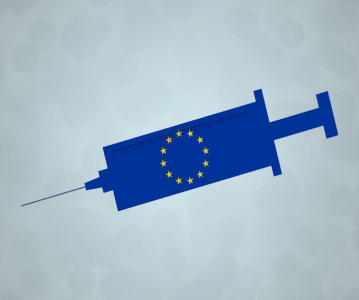FDA approves removal of boxed warning regarding serious neuropsychiatric events from Chantix labeling

Labeling revisions also include updates to corresponding warning and addition of clinical data on superior efficacy of Chantix compared with bupropion or nicotine patch.
Pfizer has announced that the FDA has approved updates to the Chantix (varenicline) labeling, including removal of the boxed warning regarding serious neuropsychiatric events. The removal of the boxed warning is based on the outcomes of EAGLES (Evaluating Adverse Events in a Global Smoking Cessation Study), the largest smoking cessation clinical trial in patients without and with a history of psychiatric disorder, and is consistent with the recent recommendation of the FDA Psychopharmacologic Drugs and Drug Safety and Risk Management Advisory Committees. Additional labeling revisions based on EAGLES include updates to the corresponding warning regarding neuropsychiatric safety and the addition of information on the superior efficacy of Chantix compared with bupropion or nicotine patch.
“For millions who smoke, stopping smoking is one of the most important steps they can take to improve their health, and Pfizer is committed to helping smokers in their quit journey,” said Freda Lewis-Hall, chief medical officer and EVP, Pfizer Inc. “We are pleased with the FDA’s decision to update the Chantix labeling based on EAGLES – the largest clinical trial of smoking cessation medications - and we expect this new information may further facilitate an informed discussion about quitting with Chantix between smokers and healthcare providers.”
“While the benefits of quitting are immediate and substantial, few smokers are able to quit on their own and need the help of counseling and smoking cessation therapy,” said Dr A. Eden Evins, director, Massachusetts General Hospital Center for Addiction Medicine and William Cox Family Associate Professor of Psychiatry in the Field of Addiction Medicine, Harvard Medical School. “As healthcare providers work on the front lines to help people who are struggling to quit smoking, this new labeling provides clinically relevant information on the safety and efficacy of Chantix to help them and their patients make informed decisions about smoking cessation treatment.”
The updated warning in the Chantix labeling notes that postmarketing reports of serious or clinically significant neuropsychiatric adverse events in patients treated with Chantix included changes in mood (including depression and mania), psychosis, hallucinations, paranoia, delusions, homicidal ideation, aggression, hostility, agitation, anxiety, and panic, as well as suicidal ideation, suicide attempt, and completed suicide. Patients attempting to quit smoking with Chantix should be observed for the occurrence of such symptoms and instructed to discontinue Chantix and contact a healthcare provider if they experience such symptoms.
In EAGLES, in the cohort of patients without a history of psychiatric disorder, CHANTIX was not associated with an increased incidence of clinically significant neuropsychiatric adverse events in a composite endpoint comprising anxiety, depression, feeling abnormal, hostility, agitation, aggression, delusions, hallucinations, homicidal ideation, mania, panic, and irritability.
In the cohort of patients with a history of psychiatric disorder, there were more events reported in each treatment group compared to the non-psychiatric cohort, and the incidence of events in the composite endpoint was higher for each of the active treatments compared to placebo: Risk Differences (RDs) (95%CI) vs. placebo were 2.7% (-0.05, 5.4) for CHANTIX, 2.2% (-0.5, 4.9) for bupropion, and 0.4% (-2.2, 3.0) for transdermal nicotine. The neuropsychiatric events of a serious nature were reported in 0.6% of CHANTIX-treated patients, with 0.5% involving psychiatric hospitalization. In placebo-treated patients, serious neuropsychiatric events occurred in 0.6%, with 0.2% requiring psychiatric hospitalization.
Related News
-
News Patients vs Pharma – who will the Inflation Reduction Act affect the most?
The Inflation Reduction Act brought in by the Biden administration in 2022 aims to give better and more equitable access to healthcare in the USA. However, pharma companies are now concerned about the other potential costs of such legislation. -
News CPHI Podcast Series: What does the changing US Pharma market mean for industry and patients alike?
In this week's episode of the CPHI Podcast Series Lucy Chard, Digital Editor for CPHI Online is joined by James Manser to discuss the political and market changes in the US pharma field. -
News CPHI Barcelona Annual Report illuminates industry trends for 2024
The CPHI Annual Survey comes into it’s 7th year to report on the predicted trends for 2024. Over 250 pharma executives were asked 35 questions, with their answers informing the industry landscape for the next year, spanning all major pharma marke... -
News Which 10 drugs are open to price negotiation with Medicare in the USA?
The Centres for Medicare & Medicaid Services, under the Biden administration in the USA, has released a list of the 10 drugs that will be open to price negotiations as part of the new legislation under the Inflation Reduction Act (IRA). -
News EU Medical Devices Regulation causes unintended disappearances of medical devices for children, doctors state
Doctor groups and associations have appealed to the EU to correct the EU Medical Devices Regulation law that may cause unintended shortages of essential drug and medical devices for children and rare disease patients. -
News 10 Major Drug Approvals So Far in 2023
Last year, 37 novel drugs were approved by the FDA, this was a high number for such a category, and covered many fields including oncology, demonstrating how promising further research is, and how it is only continuing to build. To date, there are alre... -
News Detecting Alzheimer's disease with a simple lateral flow test
A novel rapid diagnostic test for early-stage Alzheimer's disease has been developed using a biomarker binder from Aptamer Group along with technology from Neuro-Bio, the neurodegenerative disease experts. -
News CPHI Podcast Series: outsourcing and manufacturing trends
Listen to the CPHI Podcast Series this June to hear Gil Roth of the PBOA speak with Digital Editor Lucy Chard about the biggest trends and topics to watch in pharma outsourcing and manufacturing at the minute.
Position your company at the heart of the global Pharma industry with a CPHI Online membership
-
Your products and solutions visible to thousands of visitors within the largest Pharma marketplace
-
Generate high-quality, engaged leads for your business, all year round
-
Promote your business as the industry’s thought-leader by hosting your reports, brochures and videos within your profile
-
Your company’s profile boosted at all participating CPHI events
-
An easy-to-use platform with a detailed dashboard showing your leads and performance







